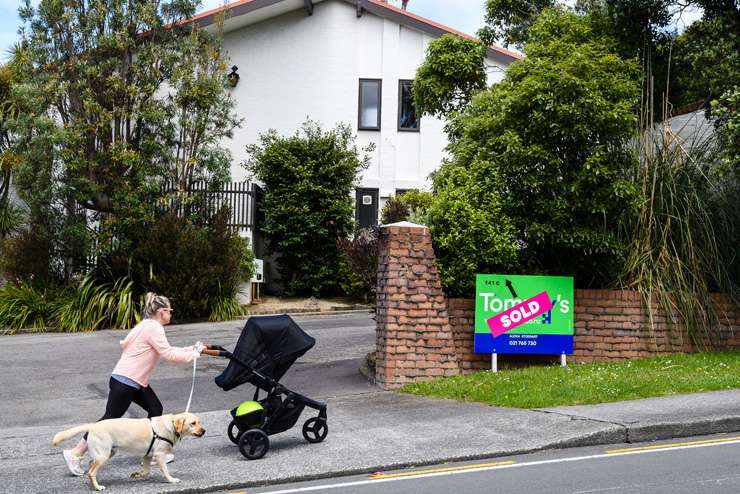Agents or homeowners who drag their feet over removing real estate signs after a property sells could see themselves slapped with a fine or given a warning by way of an official phone call.
In an attempt to avoid clutter on the verge and ensure there’s clear visibility on the streets, councils around the country have their own rules included in their district plans around how long a real estate sign can be up before and after the property sells.
Several real estate agents in Christchurch have been slapped on the hand in the 12 months for not removing their real estate signs and two had to cough up $300 in fines, while the third agent dodged the fee by acting swiftly.
Christchurch City Council rules state the sign must be removed immediately after completion of the sale and this is usually interpreted as after settlement.
Start your property search
A council spokesperson said the council asked affected parties to remove their signage to achieve compliance and if it was not removed then staff could issue an infringement notice.
In the last year only Christchurch agents have been forced to cough up, while salespeople in other parts of the country have simply got away with a warning.
Read more:
- Waiheke helipad home sells for $17.5m - nearly $10m above CV
- Too low? ‘Insulting offers’ getting zero traction in current market
- Tony Alexander: Why April’s interest rate decision is the one that really matters
Ray White Metro sales and auction manager Richard Withy said over the years he was aware of council calling agents from time to time about signs, but hadn’t heard of anyone being fined.
“I’m aware that at certain times they will ring and ask for signs to be removed if they are there for too long or if they are in the wrong position according to the bylaw, say if it’s on a verge.”
But Withy said agents are aware of the rules around signage and placement and always try to adhere to them.
“We’ve had occasions where a neighbour of someone in the public may inform the council that it’s not quite as per bylaw. The council is pretty good generally at giving a warning and just asking for it to be moved or removed and so that’s what happens.”
Tauranga agents who breach the bylaw relating to how long signs can be up for could face a maximum penalty of $20,000 – but so far no one has paid a cent.
Tauranga City Council received one complaint in the last year about a real estate sign being up for more than two weeks after a property was sold and contacted the agent who removed the sign.
“As this is complaint-based and the single complaint mentioned above was resolved with minimal contact with the agent, the cost is minimal and forms part of the usual workload of a Bylaws Officer,” Tauranga City Council democracy services team leader Kath Norris said in an Official Information Act response.

Christchurch City Council rules state that real estate signs must be removed immediately after a sale is completed. Photo / Peter Meecham
In Hamilton, it is the property owner not the agent who is responsible for making sure the sign doesn’t flaunt the rules set out in its district plan. Property owners must remove the sign within 14 days after the transfer of property ownership has been completed.
Hamilton City Council planning guidance manager Grant Kettle said if the council received a complaint about the sign breaking its rules, the council’s planning compliance team would investigate and if the property owner doesn’t remove it, they could be pinged with a $300 infringement notice.
In the last 12 months, Hamilton City Council had not received any complaints for non-complying real estate signs on private property.
Wellington’s rules appeared to be stricter than some of the other large cities and under its temporary sign rule, real estate signs are only allowed to be up for a maximum of 28 days before and seven days after the property has been sold.
Wellington City Council spokesman Richard MacLean said the council prefers to take an educational approach and as a matter of general practice has not enforced its signage rules through infringement penalties. However, penalties would be handed out if there was evidence of repeated or recidivist offending.
“Council expects the real estate industry will apply a degree of self-control and self-regulation so as not to lead to clutter or signs being up longer than they should and will act on specific complaints,” he said.
The number of complaints received often coincides with how buoyant the market is, he added.

A real estate sign outside a home in Wellington. Photo / Getty Images
Tommy’s principal Nicky Cruickshank said it was not a rule she was aware of and only being allowed to have a sign up for 28 days was tricky when the average property was now taking 72 days to sell.
“We have certainly not been restricted on that one before.”
Real estate signs could be placed on private property, but if an agent wanted to erect one on Wellington City Council land a permit was required, she said.
“If you don’t apply for a permit or it doesn’t get approved then the sign gets removed. They’ve talked about a $400 sign, but I don’t know if anyone has enforced that,” she said.
“They are very strict here in Wellington – even to the point of putting out those little open home arrows that point to where houses are.
“It’s very hard to advertise a house that’s not on a main route or somewhere with through traffic because you just simply can’t put a sign up to advertise it.”
Cruickshank said they abide by the rules especially as the metal reusable real estate signs are difficult to get back if they are confiscated and at about $400 to $500 each are expensive to replace.
Meanwhile Auckland agents also have to act a bit quicker when it comes to removing their signs and only have five working days after a sold sticker is placed on the sign or 10 working days after the property is sold to take it away before the council intervenes.
A real estate sign also cannot be left up in front of an Auckland property for more than six months in any consecutive 12-month period.













































































